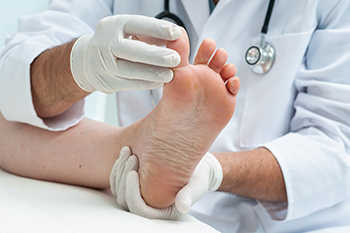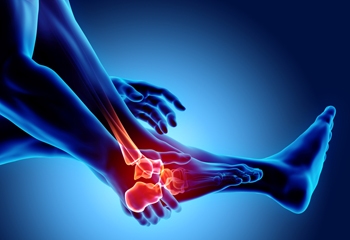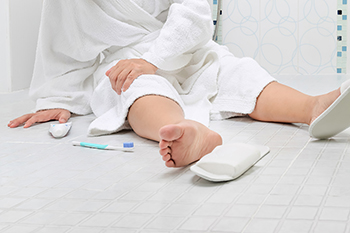6650 Frankford Ave
Philadelphia, PA 19135

Podiatry involves dealing with a multitude of possible problems people have with their feet and ankles. These can range from ingrown toenails to abnormal foot structures. Among the problems that a podiatrist handles are biomechanical and gait issues, including those involving children who may have congenital or developmental foot maladies. Another important podiatric service designed to correct various foot abnormalities is prescribing custom orthotic devices. Some are made for comfort and support while others can correct specific conditions, such as overpronation or flat feet. A podiatrist is an expert in managing the side effects of diabetes, especially dealing with foot ulcers and their maintenance and treatment. Podiatrists are also educated and trained to deal with more routine ailments, such as corns on the feet, blisters that have become infected, athlete’s foot and other fungal infections. In some cases, a podiatrist may be called on to perform surgery, including toenail removal or a bunionectomy. Podiatrists can also recommend appropriate footwear as well as provide guidance on exercises to stretch and strengthen the feet. For help with any foot problems, it is suggested that you make an appointment with a podiatrist for an exam and options for treatment.
If you are dealing with pain in your feet and ankles, you may want to seek help from a podiatrist. Feel free to contact John M. Fanelly, DPM from Northeast Philadelphia. Our doctor can provide the care you need to keep you pain-free and on your feet.
What Is a Podiatrist?
A podiatrist is a doctor of podiatric medicine who diagnoses and treats conditions of the foot, ankle, and related structures of the leg. Your podiatrist may specialize in a certain field such as sports medicine, wound care, pediatrics, and diabetic care. Podiatrists have the ability to become board certified through training, clinical experience, and then taking an exam.
What Do Podiatrists Do?
On a daily basis, a podiatrist may perform the following activities:
It is very important that you take care of your feet. It’s easy to take having healthy feet for granted, however foot problems tend to be among the most common health conditions. Podiatrists can help diagnose and treat a variety of feet related conditions, so it is crucial that you visit one if you need assistance.
If you have any questions please feel free to contact our office located in Philadelphia, PA . We offer the newest diagnostic and treatment technologies for all your foot and ankle needs.

There is a disorder that attacks an individual's immune system that may result in rheumatoid arthritis, which is abbreviated as RA. It targets the cells in the lining of the joints, and will often affect both feet. This is a condition that causes severe inflammation and pain, and it can be difficult to walk and complete daily activities. Some of the beginning symptoms of RA can consist of having a slight fever, fatigue, or unexplained weight loss. There may be factors that can contribute to getting RA, including smoking, obesity, and it may be more prevalent among women. Practicing a gentle exercise routine may provide moderate relief for patients who are afflicted with RA, in addition to taking certain medications. If your feet are stiff and it is painful to walk, it is suggested that you contact a podiatrist who can effectively diagnose RA, and offer correct treatment solutions.
Because RA affects more than just your joints, including the joints in your feet and ankles, it is important to seek early diagnosis from your podiatrist if you feel like the pain in your feet might be caused by RA. For more information, contact John M. Fanelly, DPM of Northeast Philadelphia. Our doctor will assist you with all of your podiatric concerns.
What Is Rheumatoid Arthritis?
Rheumatoid Arthritis (RA) is an autoimmune disorder in which the body’s own immune system attacks the membranes surrounding the joints. Inflammation of the lining and eventually the destruction of the joint’s cartilage and bone occur, causing severe pain and immobility.
Rheumatoid Arthritis of the Feet
Although RA usually attacks multiple bones and joints throughout the entire body, almost 90 percent of cases result in pain in the foot or ankle area.
Symptoms
Diagnosis
Quick diagnosis of RA in the feet is important so that the podiatrist can treat the area effectively. Your doctor will ask you about your medical history, occupation, and lifestyle to determine the origin of the condition. Rheumatoid Factor tests help to determine if someone is affected by the disease.
If you have any questions please feel free to contact our office located in Philadelphia, PA . We offer the newest diagnostic and treatment technologies for all your foot and ankle needs.

The risk of falling increases with age due to declining physical health, greater mobility issues, a more sedentary lifestyle, vision problems, hazards in the home, and side effects of medications. Falling can be serious for older people and is one of the leading causes of injury, disability, or even death in this age group. Stability and balance can be issues for seniors, which makes falling a risk. Because vision declines with age and older people have more eye-related diseases, seeing and judging distances becomes harder and it is easier to fall over obstacles in their environments. Issues with poor lighting, clutter, and improper maintenance in homes are more likely in this population, which also contribute to falling. Sadly, an elderly person is also more likely to fall for no obvious reason, but this can happen from a medical condition, such as a heart issue, circulation problems, or dehydration. To minimize falling and the consequences it might have, if you are a senior, it would be wise to assess and tend to home risks, get regular physical and eye exams, wear supportive and well-fitting shoes, use walking devices as needed, and try to stay as active as possible. Including a podiatrist among the health care professionals you see for routine foot exams and treatment of any current or brewing issues can increase your confidence that your mobility and independence will continue unharmed.
Preventing falls among the elderly is very important. If you are older and have fallen or fear that you are prone to falling, consult with John M. Fanelly, DPM from Northeast Philadelphia. Our doctor will assess your condition and provide you with quality advice and care.
Every 11 seconds, an elderly American is being treated in an emergency room for a fall related injury. Falls are the leading cause of head and hip injuries for those 65 and older. Due to decreases in strength, balance, senses, and lack of awareness, elderly persons are very susceptible to falling. Thankfully, there are a number of things older persons can do to prevent falls.
How to Prevent Falls
Some effective methods that older persons can do to prevent falls include:
Falling can be a traumatic and embarrassing experience for elderly persons; this can make them less willing to leave the house, and less willing to talk to someone about their fears of falling. Doing such things, however, will increase the likelihood of tripping or losing one’s balance. Knowing the causes of falling and how to prevent them is the best way to mitigate the risk of serious injury.
If you have any questions, please feel free to contact our office located in Philadelphia, PA . We offer the newest diagnostic and treatment technologies for all your foot care needs.

A large majority of people who ride bicycles experience some type of foot pain, regardless of their level of expertise or performance. While cycling, great force is generated from the legs to the feet and through to the pedals. This output of energy can result in burning, numbness, and sharp pain in the sole of the foot. A combination of long rides, warm weather, and tight shoes can make matters worse. The first way to help prevent these reactions from happening is to pay attention to footwear. Studies show that cycling shoes should be wider in the toe box to counter the swelling that occurs during a ride. Also, keeping the straps looser allows for a better range of motion. The less flexibility in the sole of the shoe, the more likely it is to cause foot pain. Special inserts are available for stiffer shoes to relieve some of the pressure on the sole of the foot. It’s a good idea to try on cycling shoes later in the day when the feet are more likely to be swollen, as they would be while riding. If you commonly endure foot pain after cycling, it is suggested that you make an appointment with a podiatrist for an exam and options for treatment.
Sports related foot and ankle injuries require proper treatment before players can go back to their regular routines. For more information, contact John M. Fanelly, DPM of Northeast Philadelphia. Our doctor can provide the care you need to keep you pain-free and on your feet.
Sports Related Foot and Ankle Injuries
Foot and ankle injuries are a common occurrence when it comes to athletes of any sport. While many athletes dismiss the initial aches and pains, the truth is that ignoring potential foot and ankle injuries can lead to serious problems. As athletes continue to place pressure and strain the area further, a mild injury can turn into something as serious as a rupture and may lead to a permanent disability. There are many factors that contribute to sports related foot and ankle injuries, which include failure to warm up properly, not providing support or wearing bad footwear. Common injuries and conditions athletes face, including:
Sports related injuries are commonly treated using the RICE method. This includes rest, applying ice to the injured area, compression and elevating the ankle. More serious sprains and injuries may require surgery, which could include arthroscopic and reconstructive surgery. Rehabilitation and therapy may also be required in order to get any recovering athlete to become fully functional again. Any unusual aches and pains an athlete sustains must be evaluated by a licensed, reputable medical professional.
If you have any questions please feel free to contact our office located in Philadelphia, PA . We offer the newest diagnostic and treatment technologies for all your foot and ankle needs.